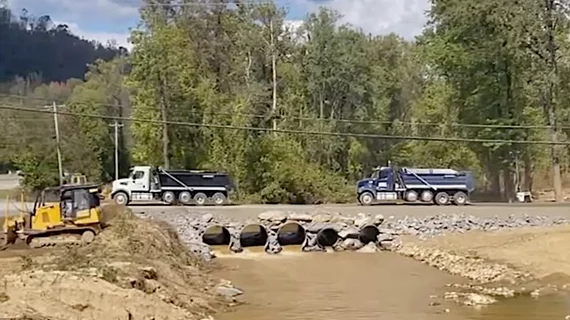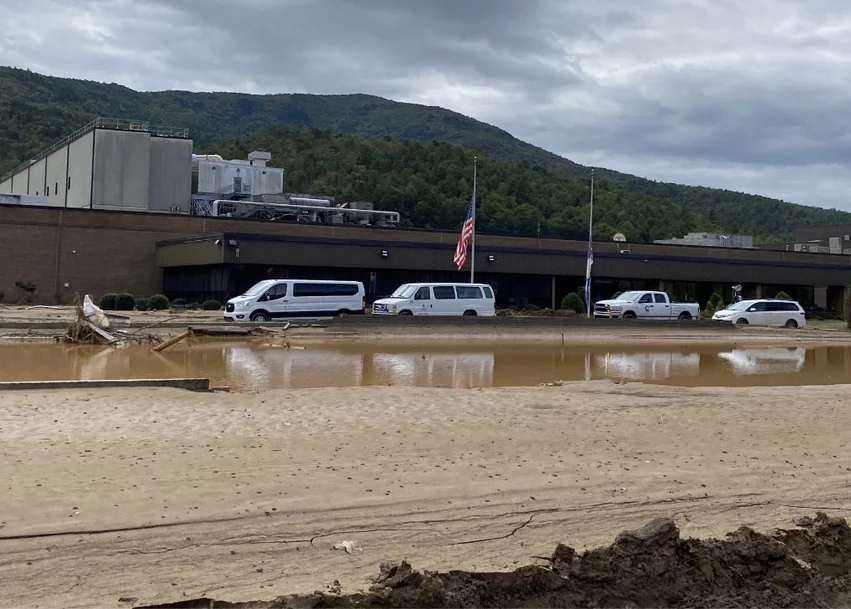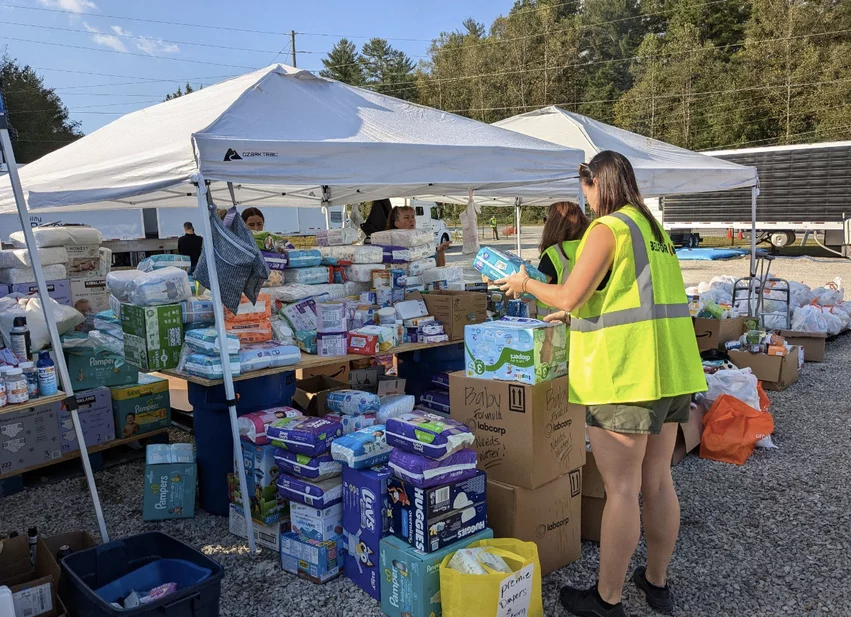Baxter works to get North Carolina IV plants back online as national shortages loom
Baxter is pouring resources into its North Cove manufacturing site in western North Carolina to get it back online after it was flooded by Hurricane Helene. The plant, which supplies 60% of IV bag in the United States, sits on a river in the mountains, where contaminated waters permeated the facility.
Two bridges that allow access to the site were also badly damaged.
Baxter said in an Oct. 7 update that it is working to get its existing stocks in storage at the plant out into the supply chain, in hopes of mitigating a potential national shortage. It is also making steady progress on cleanup and remediation. A big accomplishment in the past few days was the construction of a temporary rock bridge built over the river, which is now supporting transport in and out of the site.
"We expect a second bridge will be installed by the North Carolina Department of Transportation soon. We have not identified any structural damage to the facility to date, and we anticipate engineering certification within the next two weeks," Baxter said in a statement.
Electrical power to the site is now available. The local aquifer, which is the main source of water used in the manufacturing process, is intact and usable, the company said.
"Remediation is progressing, and we expect to begin communicating anticipated production plans within the next two weeks," Baxter added.
More than 500 workers from best-in-class remediation firms are now working onsite. That number could reach 1,0000 next week.
Recovery of existing IV stock underway
This past weekend, using the newly built rock bridge, Baxter moved finished products that were stored in semitrailers and not implanted by the flooding out of the North Cove plant site to another location outside of the disaster area.
"We have resumed shipments to hospitals and dialysis patients at previously communicated allocation levels after the temporary hold last week and are ramping up production in several global plants to help meet U.S. needs," Baxter said.
Baxter started calling back some of the plant employees late last week to help with cleanup efforts. Some workers on social media commented that the production lines they work on are intact, but in need of serious cleaning before they're operational. One worker predicted they might have cleanup completed by next week.
Baxter is also calling some employees back to work who are involved in sterilization to help to help rework additional product that is already onsite.
Rationing implemented on Baxter IV orders
To manage its dwindling supply of IV bags and ensure equitable access to the available products, Baxter implemented rating of its supplies with limits on orders. Additional information on product availability is being communicated directly to its customers, distributors and the group purchasing organizations (GPOs).
Read Baxter's Oct. 1 letter for home dialysis customers
Read Baxter's Sept. 30 letter for healthcare facilities
Federal agencies are working with Baxter
Dawn O'Connell, assistant secretary for preparedness and response for the U.S. Department of Health and Human Services (HHS) discussed the Baxter plant shutdown at a press conference at Mission Hospital in Asheville on Oct. 5. She said maintaining the medical health supply chain is a priority for HHS and they have spoken with Baxter's CEO immediately after the storm passed and the damaged was being assessed. She said HHS has been daily contact with Baxter officials since.
"Baxter fortunately have plants across the world that they are looking to access supply from and bring in. The difficulty right now for them of being able to access their plant. There is a bridge that went out that would bring things back and forth," O'Connell explained. "They invested in this on their own and put in a rock bridge to get some of the machines in to help augment and begin cleanup to get the plant back online."
Baxter said in a statement it has received tremendous support from state and local officials, including from the HHS's Administration for Strategic Preparedness and Response (ASPR) and the Federal Emergency Management Agency (FEMA). This includes expediting immediate replacement of the country bridge that was badly damage. Baxter said it expects a permanent bridge will be installed by the Army Corps of Engineers and North Carolina Department of Transportation in the coming weeks.
Andrea Palmer, deputy secretary of the U.S. Department of Health and Human Services, also spoke at the press conference and said the FDA is also in contact with other vendors that make IV supplies to try and get them to ramp up production, at least temporarily, to help overcome shortages while Baxter works to recover its stocks and get its plant back up and running.
North Cove employees are also victims of the storm
Baxter has opened a supply depot to help employees six miles south of the North Cove plant get what they need in terms of food and household supplies, including generators. The site is also offering access to showers, bathrooms and a laundromat.
Many Baxter employees had homes damaged, and in some cases swept away by mudslides and torrential flooding in the mountain valleys of the area. Others live in remote areas and are cut off and isolated because of downed trees and washed-out roads and bridges. At least one Baxter employee was killed in a mudslide that swept her home into a river.
"We continue to support our employees as they begin the recovery process. The vast majority of employees are accounted for, and we are still working to reach a small number of our colleagues. Outreach to those employees in remote locations, where people are having difficulty getting out of their homes due to damaged roads and bridges, continues door-to-door on ATVs. Supplies, electricity, and cell service remain very limited in the area," Baxter said in a statement.
Baxter has continued paying employees since the plant has been closed. The company is also offering onsite counseling and financial assistance options, including Baxter’s Employee Disaster Relief Fund to help with personal property damage and emergency expenses.
Overall, workers at the North Cove plant say in social media comments they are very happy with the support Baxter has given them and there is a wide sense of family and mission to saving lives with the work they do at the plant.
"The amount of vast supplies Baxter is offering and the amount of support we have received from this company is just unheard of. No other company is doing anywhere near what Baxter is. Very thankful for where we work," one employee wrote.
"Baxter has been amazing. For the year and a half I’ve worked there, both my leadership and coworkers have been like a second family, and the company has 100% done better than I would have imagined through this disaster," another employee wrote.



